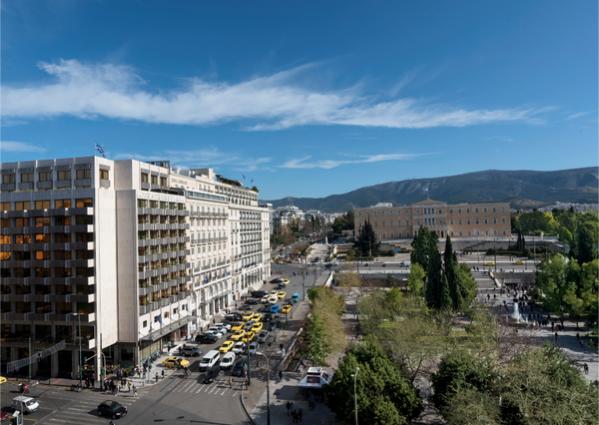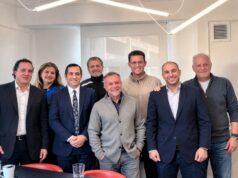With a strong sense of duty, responsibility and impeccable professionalism, the NJV Athens Plaza remained in operation during the lockdown and welcomed visitors of Athens throughout this critical period, from mid-March until today, providing accommodation with the famous Greek hospitality, but also with the most demanding hygiene and safety procedures that were imposed now more than ever.
We feel very content that we have succeeded with safety for our Guests and staff but also because this “dark” period of “loneliness” has finally come to an end, as all the hotels in our city will gradually reopen.
Having gained significant experience and valuable knowledge, all this time, we are now moving forward with optimism to attain new goals that with a lot of work and with God’s help, will be achieved.
HEALTH PROTOCOLS APPLIED AT THE NJV ATHENS PLAZA HOTEL
Action plan
The Hotel has developed an action plan and individual protocols for each section of the establishment to take measures, prevent and manage suspected Covid-19 cases in order to limit the spread of the virus to staff and guests.
The action plan is conformed by the recommendations of Greece’s public health organization – EODY.
According to the plan, the hotel management has appointed a health coordinator to supervise that protocol is being followed and a doctor on call who will act on the instructions of EODY for testing suspected cases of Covid-19.
Communication
The Hotel informed all stakeholders (employees, guests, contractors, suppliers, visitors and the public) on the measures of its action plan.
Hotel staff
All staff members:
• are aware of how the Covid-19 virus is transmitted and able to provide information to guests.
• are trained on practices for cleaning and disinfecting identified spots, on following hygiene rules to avoid transmitting the virus (frequent hand washing, avoiding handshakes, physical distancing, avoiding contact of hands with eyes, nose and mouth and respiratory hygiene).
• are provided with personal protective equipment (masks, gloves).
• undergo thermal screening every morning.
Reception
• Antiseptic for the guests, next to the hotel entrance.
• Floor marking signs of distances in the waiting area, proper arrangement of furniture in order to reduce waiting time.
• Plexiglas windows at the reception and at every desk located to the lobby.
• Frequent disinfection of reception desks.
• Staff members are keeping the appropriate distance (at least 1,5 meters from customers).
• When requested, staff is capable to inform guests on the hotel’s rules and the new measures taken.
• The Hotel provides information leaflets on basic health instructions and useful coronavirus-information for guests through the public screens and room TVs.
• For any case of emergency, a medical kit is available which includes disposable gloves and masks, antiseptics, cleaning wipes, apron, long-sleeved robe and laser thermometer.
• Staff is able to identify symptoms and report them to the health coordinator.
• All key cards are disinfected.
Cleaning, disinfection, housekeeping
• The Hotel implements improved disinfection and deep cleaning practices in accordance to EODY instructions.
• In addition to the normal cleaning procedures, the public areas, the main entrance, reception, door handles, counter tops, tables, handrails, elevator knobs and other “high-frequency “touch points” are being sanitized and disinfected frequently each day.
• Hand sanitizers are present in each public area.
• Guest rooms are receiving additional cleaning upon departure, paying particular attention to touch points.
• The daily cleaning and change of sheets, pillowcases and towels is carried out only upon request from guests.
• We have removed from all rooms, every object such as extra pillows, bedding and shared multi-purpose items such as menus, magazines, etc.
• TV and air conditioner controls have disposable covers.
• Fabric surfaces (e.g. furniture upholstery) are cleaned with a steam appliance.
• Between stays of guests, the rooms remain empty and ventilated for 24 hours.
• Customer information with special marking on when and how the room was cleaned.
F&B services
The Hotel is certified with HACCP (Hazard Analysis Critical Control Points), an internationally recognized method of identifying and managing food safety related risk.
• According to the government rules, we allowed one customer per two square meters in our restaurant and cafes. The maximum number of customers per table is six people. There is no limit in case of a family with minors.
• All staff members always wear gloves and masks.
• Extension of the operating schedule of the restaurant, for the rotating attendance of the visitors.
• Room service at no extra charge.
Central Air Conditioning
Due to the continuous, uninterrupted operation of the Hotel’s facilities and air-conditioned areas throughout March and until today, there is no health risk in the ducts and open spaces.
Central Climate Units
In all public areas of the hotel, the ventilation systems provide fresh, clean air. No air is recirculated in any area, which means that the imported air is not contaminated by the air expelled.
Particularly:
• CCU has been replaced by new technologies.
• Regular maintenance and chemical cleaning of CCU.
• Continuous filter cleaning.
• Ventilation and ventilation fans have been replaced with new technologies.
Rooms
• Room fan coil has been replaced with new technologies.
• Each room has an independent ventilation network. Ventilation systems provide fresh, clean air. Continuous ventilation is performed to prevent virus recurrence.
• Regular maintenance and chemical cleaning of fan coil.
• Continuous filter cleaning.
Venues
Conference rooms and event areas are operating according to the current legal framework. Rules for social distancing, seating distribution and gathering size apply.
A specific number of guests are allowed in each space, depending on size.
Public areas
• Social distancing rules applied in public areas include lobby, seating area, outdoor seating, etc.
• Signage and floor markings are present to remind customers to keep their distance from one another.
• Installation of antiseptic solutions in all public areas.
Elevators
• Recommendation to avoid the use of elevators.
• Installation of disinfectants at elevator entrances and recommendation for use upon entrance and exit.
• Frequent cleaning of elevators especially on “high-frequency touch points” such as handles and knobs.












